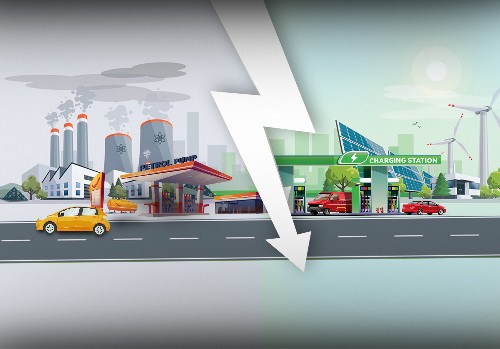With the increasing concerns about climate crises and the impact of fossil fuels on the environment, the need for alternative energy sources has become more important than ever. Alternative energy sources are renewable and sustainable, and they do not contribute to the greenhouse effect or air pollution. In the next decade, we can expect to see significant changes in the way we produce and consume energy. Let’s take a closer look at the future of alternative energy and what we can expect to see in the next decade.
Current Energy Sources
Currently, the world’s primary source of energy is fossil fuels, such as coal, oil, and natural gas. These non-renewable resources are finite and have a significant impact on the environment. Fossil fuels are burned to produce electricity, which contributes to the greenhouse effect, air pollution, and climate change. Alternative energy sources are renewable, and they do not have the same negative impact on the environment.
Best Types of Alternative Energy
There are several types of alternative energy sources that are available today, including solar, wind, hydro, geothermal, and biomass. Solar energy is generated by using photovoltaic cells to convert sunlight into electricity. Wind energy is generated by using wind turbines to convert the kinetic energy of the wind into electricity. Hydro energy is generated by using the force of water to turn turbines, while geothermal energy is generated by tapping into the heat of the earth’s core. Biomass energy is generated by using organic matter, such as plants and waste, to produce electricity. All of these sources are renewable and sustainable, making them the best types of alternative energy.
Most Reliable Source of Energy
The most reliable source of alternative energy depends on several factors, such as location, climate, and resources. Solar energy is a reliable source of energy in areas that receive a lot of sunlight throughout the year. Wind energy is reliable in areas that experience consistent winds. Hydro energy is reliable in areas with a consistent supply of water. Geothermal energy is reliable in areas with geothermal activity. Biomass energy is reliable in areas with abundant organic matter. The reliability of each energy source varies depending on the location and resources available.
Need for Switching Source of Energy
The need for switching to alternative energy sources is urgent. Fossil fuels are non-renewable and finite resources that have a significant impact on the environment. The burning of fossil fuels contributes to air pollution, which has negative impacts on human health. The greenhouse effect caused by the burning of fossil fuels contributes to climate change, which has severe consequences for the planet. Switching to alternative energy sources is necessary to reduce our dependence on fossil fuels and mitigate the negative impacts of climate change.
Future of Energy
The future of energy is renewable and sustainable. In the next decade, we can expect to see significant changes in the way we produce and consume energy. Renewable energy sources, such as solar and wind, will become more accessible and affordable.
Advances in technology will improve the efficiency and reliability of renewable energy sources. Battery storage technology will become more efficient, making it possible to store excess energy generated by renewable sources for later use. Energy grids will become smarter, allowing for better management and distribution of energy. Governments will continue to incentivize the development and adoption of renewable energy sources.
Benefits of Making the Switch
Not only will switching to these sources wil reduce our dependence on finite and polluting fossil fuels, but it will also help to mitigate the negative impacts of climate change. By switching to renewable energy sources, we can reduce greenhouse gas emissions and improve air quality, leading to better overall health for both humans and the environment.
In addition, the switch to alternative energy sources will also create new job opportunities and drive economic growth. As the demand for renewable energy increases, new jobs will be created in manufacturing, installation, and maintenance of renewable energy systems. This will help to boost local economies and drive innovation in the energy sector.
Another benefit of switching to alternative energy sources is energy security. Renewable energy sources are distributed and abundant, reducing the reliance on imported fossil fuels from politically unstable regions of the world. This will help to reduce the risk of energy supply disruptions, ensuring a reliable and consistent energy supply for businesses and consumers.
Overall, the future of alternative energy is exciting, and we can expect to see significant changes in the way we produce and consume energy in the next decade. The shift towards renewable energy sources is necessary to mitigate the negative impacts of climate change, reduce dependence on fossil fuels, and create new job opportunities and economic growth. By embracing the opportunities presented by alternative energy sources, we can build a more sustainable and prosperous future for ourselves and the planet.
New Technologies in ESS (Energy Storage Systems)
Lithium-ion batteries are a widely used energy storage technology that has revolutionized the electronics and transportation industries and that’s where Evolute Cleantech plays a major role. However, researchers and companies are constantly working on developing new and improved lithium battery technologies to increase their energy density, safety, and lifespan, and to lower their cost.
Here are some of the latest advancements in lithium battery technology:
Solid-State Lithium Batteries : Solid-state batteries use a solid electrolyte instead of a liquid one, which offers several advantages such as higher energy density, longer lifespan, and lower risk of fires and explosions. They also have the potential to be manufactured using cheaper and more abundant materials than current lithium-ion batteries.
Lithium-Sulfur Batteries : Lithium-sulfur batteries offer much higher energy density than lithium-ion batteries, which means they can store more energy in a smaller package. However, they have been plagued by issues such as short lifespan and low efficiency. Researchers are currently working on improving their performance by developing new electrode materials and electrolytes.
Overall, the development of new lithium battery technologies is crucial to enable the transition to a low-carbon economy and meet the growing demand for clean and sustainable energy





